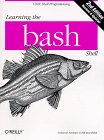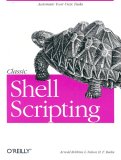This tutorial covers the basics of using bash shell scripts for web server CGI. Default Red Hat Linux directory configurations for Apache are used in this tutorial. The HTML ISINDEX tag is used for data input to the script.
CGI uses two methods to pass data between the browser and the web server, GET and POST. The GET method passes data in the URL and is the method employed here. The web server will pass environment variables into the execution environment of the CGI shell script which also may be used.
CGI Shell script to output a text page: /var/www/cgi-bin/cat-a-text-page
#!/bin/bash
CAT=/bin/cat
COLCRT=/usr/bin/colcrt
echo Content-type: text/plain
echo ""
if [[ -x $CAT && -x $COLCRT ]]
then
$CAT $1 | $COLCRT
else
echo Cannot find command on this system.
fi
Usage: <A HREF="/cgi-bin/cat-a-text-page?/home/user1/public_html/text-file.txt">Text of link</A>
Note:- the permissions on the shell script must changed to make the script executable: chmod +x cat-a-text-page
- the shell /bin/sh was often used in older systems and was a link to /bin/bash (most Red Hat Linux systems). The behavior of shells other than Bash is not covered in this tutorial. Debian currently softlinks /bin/sh to /bin/dash which does not behave the same. It is best to specify the Bash shell explicitly: #!/bin/bash
CGI Shell script: /var/www/cgi-bin/Output-text-as-html
#!/bin/bash echo Content-type: text/html echo "" /bin/cat << EOM <HTML> <HEAD><TITLE>File Output: /home/user1/public_html/text-file.txt </TITLE> </HEAD> <BODY bgcolor="#cccccc" text="#000000"> <HR SIZE=5> <H1>File Output: /home/user1/public_html/text-file.txt </H1> <HR SIZE=5> <P> <SMALL> <PRE> EOM /bin/cat /home/user1/public_html/text-file.txt CAT << EOM </PRE> </SMALL> <P> </BODY> </HTML> EOM
Usage: <A HREF="/cgi-bin/Output-text-as-html">Text of link</A>
The Web Page:
Test of ISINDEX HTML tag:
|
HTML Source:
<HTML> <HEAD><TITLE>Test ISINDEX HTML tag</TITLE></HEAD> <BODY bgcolor="#cccccc" text="#000000"> <H2>Test ISINDEX HTML tag</H2> <ISINDEX prompt="Enter value:" action="http://localhost/cgi-bin/catpage"> </BODY> </HTML>
Text entered: /tmp/text-file.txt
The following will get generated: http://localhost/cgi-bin/catpage?%2Ftmp%2Ftext-file.txt
The CGI will then spit out the text page specified.
[Potential Pitfall]: Currently Mozilla 1.2.1 (Also default Red Hat 8.0 and 9.0) browsers have a bug which prevents this from operating properly. Konqueror, Netscape, Lynx all work properly.
In this case the script will generate all displayed interfaces. This example is the easiest form of a simple on-line database. (Grep/search a file and output the results of the search)
CGI Script:
CGI Shell script: /var/www/cgi-bin/isindex-search#!/bin/bash echo Content-type: text/html echo "" if [ $# = 0 ] then /bin/cat << EOM1 <HTML> <HEAD><TITLE>Text search </TITLE> </HEAD> <BODY bgcolor="#cccccc" text="#000000"> <HR SIZE=5> <H1>Text search </H1> <P> <ISINDEX prompt="Enter search string: " action="http://localhost/cgi-bin/isindex-search"> <P> </BODY> </HTML> EOM1 else /bin/cat << EOM2 <HTML> <HEAD><TITLE>Search results for $* </TITLE> </HEAD> <BODY bgcolor="#cccccc" text="#000000"> <HR SIZE=5> <H1>Search results for $* </H1> <HR SIZE=5> <P> <PRE> EOM2 grep -i "$*" /home/user1/file-to-search.txt /bin/cat << EOM3 </PRE> <P> </BODY> </HTML> EOM3 fi
Results:
- Usage: http://localhost/cgi-bin/isindex-search
- Enter text string to search for and press enter:
[Potential Pitfall]: ISINDEX is getting old and is less supported in modern browsers. The above example may not render properly in your browser as it is also the second ISINDEX statement in this page.
Text search
- The script will spit out the search results of the grep in an HTML page.
The web server will execute the CGI script in its own process space but will set some usefull environment variables. To view these use the following script: /var/www/cgi-bin/env.sh
#!/bin/bash echo Content-type: text/html echo "" /bin/cat << EOM <HTML> <HEAD><TITLE>File Output: /home/user1/public_html/text-file.txt </TITLE> </HEAD> <BODY bgcolor="#cccccc" text="#000000"> <P> <SMALL> <PRE> EOM /bin/env CAT << EOM </PRE> </SMALL> <P> </BODY> </HTML> EOM
Make script executable: chmod ugo+x env.sh
Test: http://localhost/cgi-bin/env.shOutput: (example)
SERVER_SIGNATURE= Apache/2.0.40 Server at localhost Port 80 UNIQUE_ID=DErk6n8AAAEAAAblFQEAAAAD HTTP_USER_AGENT=Mozilla/4.8 [en] (X11; U; Linux 2.4.18-27.8.0 i586) SERVER_PORT=80 HTTP_HOST=localhost DOCUMENT_ROOT=/var/www/html HTTP_ACCEPT_CHARSET=iso-8859-1,*,utf-8 SCRIPT_FILENAME=/var/www/cgi-bin/env.sh REQUEST_URI=/cgi-bin/env.sh SCRIPT_NAME=/cgi-bin/env.sh HTTP_CONNECTION=Keep-Alive REMOTE_PORT=32984 PATH=/sbin:/usr/sbin:/bin:/usr/bin:/usr/X11R6/bin PWD=/var/www/cgi-bin SERVER_ADMIN=root@localhost HTTP_ACCEPT_LANGUAGE=en HTTP_ACCEPT=image/gif, image/x-xbitmap, image/jpeg, image/pjpeg, image/png, */* REMOTE_ADDR=127.0.0.1 SHLVL=1 SERVER_NAME=localhost SERVER_SOFTWARE=Apache/2.0.40 (Red Hat Linux) QUERY_STRING= SERVER_ADDR=127.0.0.1 GATEWAY_INTERFACE=CGI/1.1 SERVER_PROTOCOL=HTTP/1.0 HTTP_ACCEPT_ENCODING=gzip REQUEST_METHOD=GET _=/bin/env
These environment variables provided by the web server can be used in your script to suit your needs.


 Books:
Books:



